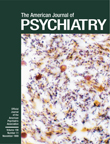Antidepressant-Benzodiazepine Combination Therapy
To the Editor: Ward T. Smith, M.D., and his colleagues’ (1) recent randomized controlled trial of fluoxetine and fluoxetine plus clonazepam represents an important contribution to the problem of antidepressant-benzodiazepine combination therapy for major depression, which is widely practiced in the real world but may not have a solid evidence base. The editor of the Journal, Nancy C. Andreasen, M.D., Ph.D., called the rapidity of the response to this combination therapy striking.
Dr. Smith et al.’s review of the extant literature on this topic, however, is slanted. The authors cite four randomized controlled trials in which they claim to have demonstrated positive results for a combination therapy of tricyclics and benzodiazepine. There are many ways that the experimental therapy can be better than the control therapy, but when we limit ourselves to the primary end point measure of depression, at least one (2) and possibly two more (3, 4) of these four did not report any positive results. More important, a systematic search of MEDLINE revealed at least five more relevant randomized controlled trials, three of which were negative (5–7), and another randomized controlled trial that reported significant worsening of depression upon discontinuation of benzodiazepine after successful combination therapy.
The effectiveness of a treatment should be judged on the basis of the totality of the evidence available to humankind, because any one randomized controlled trial, even when not subject to publication bias, is always subject to random variation, and if you conduct enough trials, there will almost always be those with positive results. The researchers need to conduct their own study and allow readers to view it under the appropriate perspectives.
1. Smith WT, Londborg PD, Glaudin V, Painter JR: Short-term augmentation of fluoxetine with clonazepam in the treatment of depression: a double-blind study. Am J Psychiatry 1998; 155:1339–1345Google Scholar
2. Fawcett J, Edwards JH, Kravitz HM, Jeffriess H: Alprazolam: an antidepressant? alprazolam, desipramine, and an alprazolam-desipramine combination in the treatment of adult depressed outpatients. J Clin Psychopharmacol 1987; 7:295–310Medline, Google Scholar
3. Calcedo Ordonez AC, Arosamene X, Otero Perez FJ, Hernandez Herrero C, Garcia A, Moral L, Baeza F, Fernandez Benitez J, Velasco J, Garrido J: Clomipramine/bentazepam combination in the treatment of major depressive disorders. Human Psychopharmacology 1992; 7:115–222Crossref, Google Scholar
4. Nolen WA, Haffmans PMJ, Bouvy PF, Duivenvoorden HJ: Hypnotics as concurrent medication in depression: a placebo-controlled, double-blind comparison of flunitrazepam and lormetazepam in patients with major depression, treated with a (tri)cyclic antidepressant. J Affect Disord 1993; 28:179–188Crossref, Medline, Google Scholar
5. Bowen RC: The effect of diazepam on the recovery of endogenously depressed patients. J Clin Pharmacol 1978; 18:280–284Crossref, Medline, Google Scholar
6. Dominguez RA, Jacobson AF, Goldstein BJ, Steinbook RM: Comparison of triazolam and placebo in the treatment of insomnia in depressed patients. Curr Ther Res 1984; 36:856–865Google Scholar
7. Feet PO, Larsen S, Robak OH: A double blind study in out-patients with primary non-agitated depression treated with imipramine in combination with placebo, diazepam or dixyrazine. Acta Psychiatr Scand 1985; 72:334–340Crossref, Medline, Google Scholar



